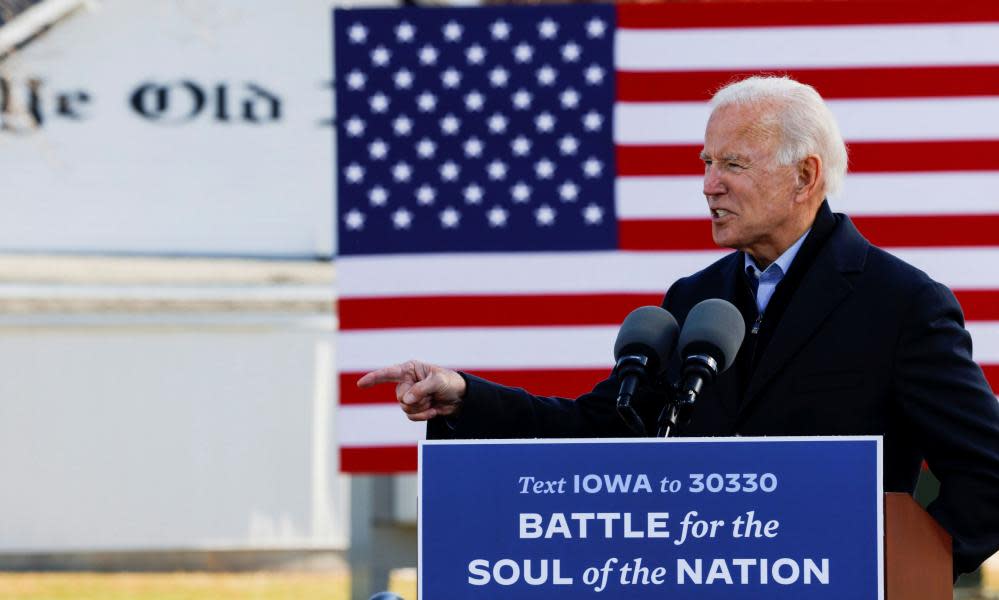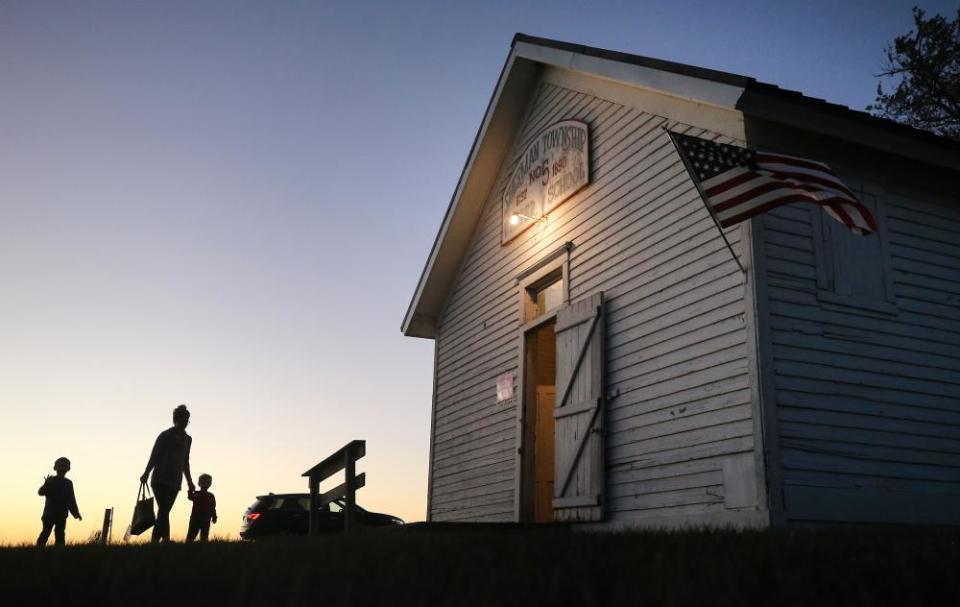Democrats got a rude awakening in rural America. Just look at Iowa

Dancing in the streets was sweet after a democracy on edge reclaimed itself by virtue of its great metroplexes. Come Monday, sobriety recalled four days spent glued to TV maps of great rural swaths of America awash in red. Iowa and Ohio, which Joe Biden himself thought were in play, went red again. The blue wall barely held in Wisconsin. The Senate majority leader, Mitch McConnell, looms large.
Poll after poll showed dead heats between Joe Biden and Donald Trump in Iowa, and between the Republican senator Joni Ernst and Democrat Theresa Greenfield. The pandemic was worsening. The economy was not well despite massive agriculture bailouts. Ernst flubbed the price of soybeans during a debate. It appeared Iowa could swing back to the Democrats. After all, Barack Obama is not that distant a memory.
Related: Joe Biden's election alone cannot heal a divided nation. We will all have to do that | Susan Bro
The final Iowa poll from the Des Moines Register on the Saturday before the election flummoxed Democrats when it showed Trump and Ernst with comfortable leads. The pollster Ann Selzer found a big shift among independents who wanted a GOP Senate to provide a check on the “socialists”.
Running against socialism when Trump larded $60bn on agribusiness in the past two years over disasters of his own making seemed like a thin soup. A rural electorate immersed in Fox News, Sinclair Broadcasting and Facebook lapped it up. The propaganda (Democrats eat babies – it’s right there on social media), the preachers in the pulpit damning liberal judges and politicians, and a relentless ground game that saw Iowa Republicans register 20,000 more voters than Democrats put a seemingly indelible red lock on what used to be a purple state.
Republicans gained seats in the Iowa house and senate, which they already controlled. The governor, Kim Reynolds, is Republican. Dubuque, where union jobs drained south of the border steadily through the decades, used to be a blue bulwark on the banks of the Mighty Mississippi. Dubuque county voted for Trump at 51% last week. The incumbent US representative Abby Finkenauer, a Democratic daughter of a Dubuque union household, was defeated by the TV news anchor Ashley Hinson, a Republican who supported Trump. The Finkenauer defeat and Ernst victory were devastating blows to a Democratic party that has lost its way along the country blacktop roads.
It’s all about owning the libs. It’s not about policy
Democrat JD Scholten
The urban-rural divide is vivid as ever. If it can’t be narrowed, American democratic liberty remains challenged. A palpable resentment among those left behind from the coastal economic juggernauts finds its expression in people dressed in Hawaiian shirts planning to kidnap the governor of Michigan and execute her to start a civil war. Believe it. Most of us are not ready to pick up a gun. But it keeps racism bubbling. It erodes trust in institutions, like our courts or elections. It prevents us from solving existential crises like the pandemic or, even more threatening, global heating.
John Russell knows the back roads. He was Elizabeth Warren’s rural Iowa coordinator, a thirtysomething reared around Wellsville, Ohio, population 3,500, nestled in the corner of Appalachia that touches Pennsylvania and West Virginia. Like Dubuque, the Ohio River Valley used to be union country – steel, autos, kilns, dirty hands. Those jobs are lost and the unions busted by President Reagan; no Mexican immigrant engineered it. Eight years ago, the Democratic state legislator from Russell’s county got 51% of the vote. This year, the Democrat got 26%. The margins were the same in rural Iowa. Turnout in rural precincts blew out the metros.
While in Iowa, Russell lived upstairs from a biker bar in Webster City, a typical county seat town of about 7,800 people that never really recovered from the farm crisis that snuffed out a generation of vitality in the 1980s. The Electrolux vacuum cleaner factory was moved to a maquiladora in Mexico. Retail trade bleeds to Amazon.com. Meantime, a new pork plant opened up nearby where the workforce is overwhelmingly Latino. Starting pay: $16 an hour, just enough to get by if you scrimp.

Russell became friends in the bar with a foreman at the pork plant married to a teacher. Their household income would be well north of $100,000, big money in a small town. “He believes crap that would make your jaw drop,” Russell said. “White folks are buying what Fox and Sinclair Broadcasting are selling – it’s Worldwide Wrestling Entertainment. Strong opinions loosely held.”
The foreman hangs with a Mexican friend, Carlos, yet he voted for an anti-immigrant president and congressman.
“Our brand is just so off,” said the Sioux City Democrat JD Scholten, who outperformed Biden but still got shellacked in his uphill run against the Republican Randy Feenstra for Congress from north-west Iowa. “It’s all about owning the libs. It’s not about policy.”
Biden’s job of uniting the country starts on the Great Plains and Appalachia. It’s a tough sell, but Biden knows how from years of horse-trading in the Senate. Two ideas with appeal: renewable energy and agricultural conservation. The Iowa senator Chuck Grassley, a Republican, purports himself to be the “father of wind energy”. McConnell is all for hemp production that could fuel a Kentucky ethanol industry and save former tobacco growers. Solar jobs at $75,000 can compete with fracking around Wellsville. Can Ohio build a better electric car than China? Hell yes, the Democrats and Republicans will reply in stereo. The Farm Bureau on the right and the Farmers Union on the left support paying farmers for environmental services like clean water and carbon sequestration. Cargill and General Mills have bought in. So has Wall Street – so long as you don’t call it the Green New Deal. We have to start somewhere patching this nation back together.
Art Cullen is editor of the Storm Lake Times in north-west Iowa, where he won the Pulitzer prize for editorial writing. He is a Guardian US columnist and author of the book, Storm Lake: Change, Resilience, and Hope in America’s Heartland

